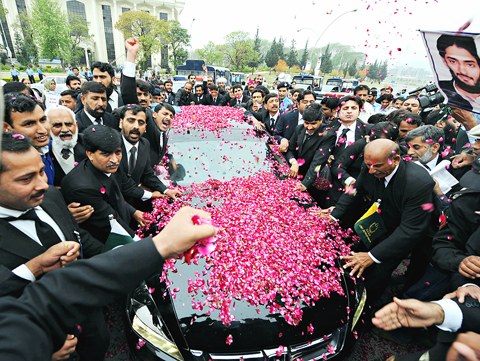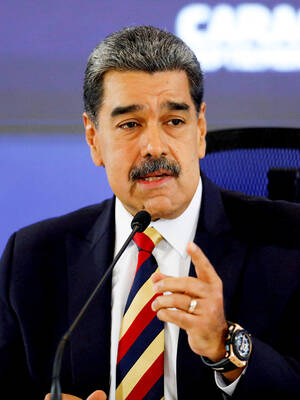Pakistan’s reinstated top judge Iftikhar Muhammad Chaudhry yesterday called on lawyers to wipe out corruption in the judiciary on his first day in court for 16 months.
Chaudhry, greeted with a standing ovation, was restored by the government on Sunday in a dramatic U-turn that has boosted hopes of an end to a debilitating crisis in the nuclear-armed nation.
Millions of Pakistanis hope his return, after former Pakistani president Pervez Musharraf sacked him in 2007, will cleanse the judiciary, but experts warn that he faces huge challenges to bring about legislative and institutional reform.

PHOTO: AFP
“It is a matter of great satisfaction and a day of thanksgiving to Allah the almighty that after a long period the original court has been restored,” Chaudhry told a courtroom packed with lawyers who rose to applaud his arrival.
“There is rampant corruption in this institution [judiciary]. This cannot be eradicated without the help of lawyers. You people should come forward to point out such cases,” he said.
“I will request all of you, being officers of this court, to put your house in order first,” Chaudhry said.
His vehicle was showered with rose petals after swinging into the supreme court compound under heavy police escort as lawyers waved Pakistani flags and welcome banners, and activists released colored balloons into the sky.
Chaudhry and 60 other top judges were sacked by Musharraf, who feared the supreme court would disqualify him from contesting a presidential election while remaining head of the military.
The announcement on March 16 that the government would reinstate the deposed chief justice was calculated to end a major crisis between opposition leader Nawaz Sharif and the deeply unpopular President Asif Ali Zardari.
The decision was made under intense Western pressure. In the wake of the move, Sharif scrapped a mass protest march on the capital, Islamabad.
Political leaders have since called for reconciliation but no concrete agreements have been announced and Sharif, the most popular politician in the country, says Chaudhry’s restoration should be followed by further reforms.
A date is still pending for the supreme court to hear a government appeal looking to overturn a Feb. 25 ruling that disqualified Sharif and his brother Shahbaz from contesting elections.
Neither has a deal been reached on ending Zardari’s direct rule in Pakistan’s most powerful province of Punjab after the court decision forced Shahbaz Sharif to leave his post as chief minister.
Chaudhry, who shies away from the media and refuses to make political statements, has a reputation as an upstanding, independent-minded judge who clashed frequently with the former Musharraf regime.
Sworn in on June 30, 2005, one of his most famous moves was to take up the cases of missing people allegedly held by Pakistani security forces or handed over to the US on terror charges.
A small group of relatives of the missing held banners outside court yesterday saying “release immediately our valuable citizens and loved ones.”
Chaudhry ordered the security services to produce several of the missing in court before he was sacked by Musharraf.
Meanwhile, a bomber blew himself up at a police station housing terrorism intelligence offices, killing himself and one officer in Islamabad.
The blast occurred late on Monday on Pakistan’s national day.
Islamist militants are blamed for near-daily attacks in the increasingly unstable country, though little information on Monday’s bomber was available.
Islamabad is one of the safer cities in Pakistan, but it has not escaped violence, including last September’s deadly suicide truck bombing at the Marriott Hotel that killed more than 50 people.
The man detonated explosives at the gate of the police station in the center of the capital, Interior Ministry secretary Kamal Shah said. He said an officer who was apparently challenging the bomber died in the blast.

‘NEO-NAZIS’: A minister described the rally as ‘spreading hate’ and ‘dividing our communities,’ adding that it had been organized and promoted by far-right groups Thousands of Australians joined anti-immigration rallies across the country yesterday that the center-left government condemned, saying they sought to spread hate and were linked to neo-Nazis. “March for Australia” rallies against immigration were held in Sydney, and other state capitals and regional centers, according to the group’s Web site. “Mass migration has torn at the bonds that held our communities together,” the Web site said. The group posted on X on Saturday that the rallies aimed to do “what the mainstream politicians never have the courage to do: demand an end to mass immigration.” The group also said it was concerned about culture,

CRACKDOWN: The Indonesian president vowed to clamp down on ‘treason and terrorism,’ while acceding to some protest demands to revoke lawmaker benefits Protests in Indonesia over rising living costs and inequality intensified overnight, prompting Indonesian President Prabowo Subianto to cancel a planned trip to China, while demonstrators reportedly targeted the homes of the finance minister and several lawmakers. Rioters entered Indonesian Minister of Finance Sri Mulyani Indrawati’s residence near Jakarta early yesterday, but were repelled by armed forces personnel, Kompas reported. Items were taken from the homes of lawmaker Ahmad Sahroni and two others, according to Detik.com. The reports of looting could not be independently verified, and the finance ministry has not responded to requests for comment. The protests were sparked by outrage over

VENEZUELAN ACTION: Marco Rubio said that previous US interdiction efforts have not stemmed the flow of illicit drugs into the US and that ‘blowing them up’ would US President Donald Trump on Wednesday justified a lethal military strike that his administration said was carried out a day earlier against a Venezuelan gang as a necessary effort by the US to send a message to Latin American cartels. Asked why the military did not instead interdict the vessel and capture those on board, Trump said that the operation would cause drug smugglers to think twice about trying to move drugs into the US. “There was massive amounts of drugs coming into our country to kill a lot of people and everybody fully understands that,” Trump said while hosting Polish President

A French couple kept Louise, a playful black panther, in an apartment in northern France, triggering panic when she was spotted roaming nearby rooftops. The pair were were handed suspended jail sentences on Thursday for illegally keeping a wild animal, despite protesting that they saw Louise as their baby. The ruling follows a September 2019 incident when the months-old feline was seen roaming a rooftop in Armentieres after slipping out of the couple’s window. Authorities captured the panther by sedating her with anesthetic darts after she entered a home. No injuries were reported during the animal’s time on the loose. The court in the